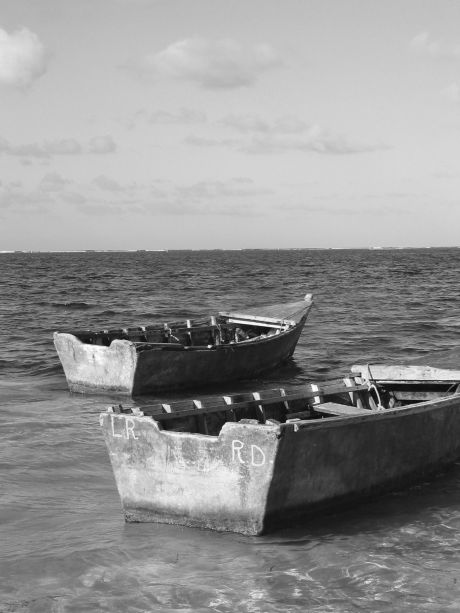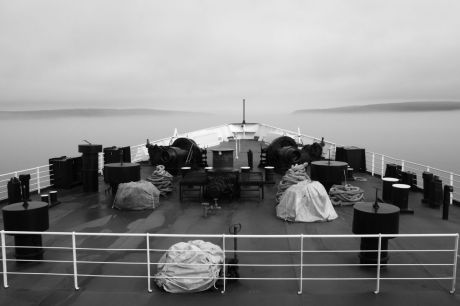
A Sermon Preached on Sunday, August 7, 2011
Listen to my entire sermon:
I Kings 19.9-18, Matthew 14.22-33
As many of you know, my mother lives at Judson Park, a local retirement community with a complete continuum of care. She moved into a lovely independent living apartment about five years ago when she decided she didn’t want to live on her own anymore.
One of the benefits of places like Judson is the community that is formed among the residents. My mother has enjoyed a depth of friendship and companionship that is among the richest she has experienced in her 88 years of living.
In my daily conversation with Mom, I usually ask, “What did you do today?” And until recently, she would frequently answer, “I went to visit someone on the other side.” The other side is code among my mother’s friends for the assisted living and nursing home sections of Judson. I would usually respond, “That’s nice of you,” and she would reply, “Well, I have friends there, and it’s good to see how the other half lives.” I always took this to mean that someday, she too would cross to the other side.
That day has come. Tomorrow my mother will cross to the other side into the Memory Unit, and in some profound way, I will both cross with her and say farewell on a distant shore.
Memory loss among elders is something one fears and dreads, and yet when it happens, it is probably more painful for those left behind than those going through it. I always heard that with dementia, one makes new friends everyday among those whom one has known a long time or even a lifetime. My mother is no exception. Whenever I eat with her in the dining room, I am introduced to all of her friends for the um-teenth time. At least, she still remembers my beloved Emily, my brother Tom, and me. And whether she remembers you or not, my mother will greet everyone with a great big, warm smile and hello.
Memory loss is something that creeps up on you, and then suddenly one day, it takes over both the mind and the body. Yesterday, she knew it was happening to her, and today she doesn’t. Now that I’ve been assured that Mom is not sad and doesn’t really understand what’s happening to her, I feel a combination of sadness, fear and relief. I suppose you can say that we’re both going through one of those rites of passage. We’re both crossing to the other side.
This morning’s gospel reading recounts Jesus’ invitation to his disciples to cross to the other side. Jesus had collected a small band of people to be his disciples, and he wanted to teach them about being in relationship with God and about the realm of God that was at hand. He also wanted to instruct them about living a life of expectant faith, confident that God was always there to be found. He desired that his friends become aware of the abiding presence and saving power of the Holy One, so that they would possess the courage and faith to face whatever circumstances life presented.
Thus far, the disciples’ journey with Jesus had been filled with learning, wonder, and excitement. At the same time, it had been fairly safe. They were operating in familiar territory, on their home turf. But now, it was time to break camp and move out, to expand their horizons to new places and new people. Like pioneers in every age, Jesus and his band of followers were being called to leave home and travel across the border to the frontiers of a foreign land. It was time to traverse the threshold of recognizable place, to jump over the edge, and “to go across to the other side.”
To understand more deeply what Jesus was instructing his disciples to do, I invite you to consider the wisdom of The I-Ching, an ancient Chinese practice of prayer and meditation based on the synchronicity of chance and probability. As a treatise on change, the phrase “crossing the great water” frequently appears in the text and commentary of The I-Ching. It signifies moving across the threshold, over the edge, and to that which is unknown and unfamiliar.
When we “cross the great water,” we often are confronted with our true nature, facing directly into our own fears and moving through them, not around them. In the crossing, the journey, like a submarine, frequently travels down into the deep water toward the confusion, chaos and doubt of the dark night of our brokenness and our uncertainty. Yet in the crossing, we discover our wounds enveloped by the healing waters of compassion. In the midst of our internal doubts and fears, we find in the deep the love that will not disappear or die.
Like Jesus, The I-Ching says that the wise one (the one who has faith) “perseveres by crossing the great water.” Throughout our lives, we are called to make many crossings.
- We go across to the other side when we accept a new job or move to a new city, start a new school year or attend a new summer camp.
- We cross the great water when we begin a new relationship or get married, have a child or move in with our grown children.
- We cross to the other side when we move from independent living into a nursing home facility.
- We cross to the other side when, like my mother, we lose our memory, and we cross to the other side when, our parents need us in ways that we once needed them.
- We also make such crossings when we’re told we have cancer or some other life-threatening illness, when our spouse wants a divorce, when we’ve lost a job, if we are imprisoned, or God forbid, shipwrecked or held captive against our will.
- And I’m beginning to think that communities, cities, states, nations, even the globe are often required to make such crossings. Isn’t the worldwide economic and environmental crisis a crossing of the great waters of life as we know it?
In all these situations, we are often forced to leave behind familiar surroundings, material possessions, daily routines, personal habits, and sometimes friends and family. We frequently have to test new skills and unearth talents undiscovered, develop new patterns and routines of daily life, acquire new property, accept new family members, and form new friendships.
Some people who like change make these transitions with relative ease and enthusiasm; and others, such as military families, learn how to make them out of necessity. Some individuals resist such crossings with all their might; and others, like my mom, might not even fully realize that they are making the crossing.
We might not always be in control of the circumstances in which we find ourselves during or after the crossing, but we are capable of determining what attitude we will hold in any given set of circumstances. You can take everything away from us, but you can’t take our spirit, because that comes from God. On some profound level, we always able to decide how we will live.
When we are no longer able to change a situation, we are challenged to change ourselves. And the decision to change ourselves might just be what saves us in the storms that are almost inevitable with a great crossing. For in the decision to change ourselves, we turn inward, and in that turn, we meet God.
Think about this morning’s gospel story. The disciples are crossing to the other side and a storm arises. Trying to manage in their little boat, they become frightened. And then they see Jesus walking toward them. As the story goes, Peter gets out of the boat and begins walking on the water toward Jesus. Miraculously, he’s doing fine until he looks down at his feet. And then he begins to panic and sink into the water. Fortunately, Jesus reaches out and saves him.
Now, this story might sound unbelievable, but maybe not. Maybe, there’s more to it than meets the eye. Do you remember Philippe Petit, the tightrope walker who crossed between the towers of the World Trade Center? In Man on a Wire, we learn that this man did the unthinkable – he walked 200 feet on ¾ inch wire 1350 feet above the ground. How did he do it? It was all about faith, focus and practice. And so it might have been for Peter.
Upon undertaking the great crossing and finding ourselves in the middle of the rough waters and turbulent winds, many of us look down at our feet and panic. Where am I? How did I get here? How do I get out of this? And that’s where God appears.
Elijah was in the middle of a great crossing when he got caught in a storm. He had been out there zealously defending the name of the Lord, and found himself alone hiding in a mountain cave. God instructed him to stand on the mountain, and there, Elijah witnessed a great wind, an earthquake, and a fire. Can you imagine how frightened he must have been? But in the midst of the storm, Elijah was not abandoned. In “a sound of sheer silence,” Elijah heard the voice of God, calling him to a new place, a new crossing.
I know thatlife feels pretty stormy for lots of us right now. It should not come as a surprise, for, as a society, as a globe and perhaps as the human species, we are in the middle of a huge crossing. We are on the way to another shore, but right now, the waves are very big and scary.
So I want to share one thought with you. We are not alone! God is always with us – even when we don’t know it. We just have to look up and believe. In the end, all of these crossings prepare us for the final one – the journey toward eternal life. And that is the greatest crossing – the one that nobody gets to avoid.
As Peter and Elijah both learned, and as my mom and I are now learning in a new way, when you cross to the other side, God is walking with you, ready to catch you when you fall – even if you can’t remember.




